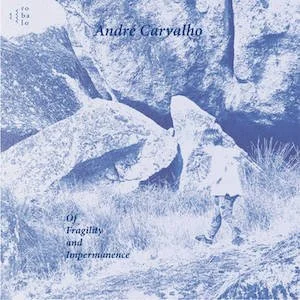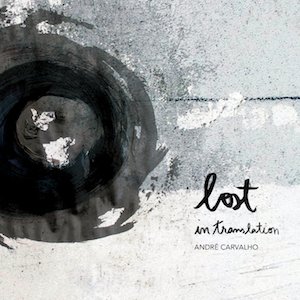Label: Robalo, 2025
Personnel - Andre Carvalho: double bass; José Soares: alto saxophone, bass clarinet; Raquel Reis: cello; Samuel Gapp: piano; João Hasselberg: electronics.
Inspired by parenthood, a series of life changes that led to self-discovery, as well as memories of his own childhood, Portuguese bassist and composer André Carvalho releases Of Fragility and Impermanence, a collection of 12 tracks that firmly situates itself on the left side of the jazz spectrum. Throughout his career, Carvalho—who lived in New York for seven years—has consistently demonstrated his strengths as a composer, leader, and sideman. More recently, he has devoted time to film scoring, earning several awards in the process.
The fascinating “A Galope” opens the album, foregrounding electronics and shaping its ebb and flow through counterpoint and carefully paced motion. Rooted in contemporary classical music, jazz experimentalism, and the fertile space between them, the piece builds toward a vibrant rhythmic current before receding quietly. Carvalho’s trenchant arco work and Samuel Gapp’s expansive piano gestures are especially striking here. “Dentes de Leite” follows as a vaporous ballad whose poised elegance is matched by its sophisticated 3+3+2 pulse.
The quintet’s unconventional instrumentation serves the poignant “Dores de Crescimento”, an ambient piece grounded in cello legato, bass, and electronics, and crowned by serene piano lines and José Soares’ drifting, ethereal saxophone. Channeling modern classical figures such as Ives, Mompou, and Debussy, the piece also reflects a modal sensibility reminiscent of English saxophonist John Surman. “Echoes” leads us into a strange yet quietly magical realm, balancing serenity, ambiguity, and emotion, and evoking a cinematic surrealism through contrasting timbres and softly undulating waves of warmth.
“Infância” stands confidently on its own as a feature for bass and saxophone, their reciprocal dialogue lightly veiled by a thin haze of electronics. It recalls the classically inflected work of Tuxedomoon’s Steven Brown. “The Journey of Kanji Watanabe”—named after the protagonist of Akira Kurosawa’s Ikiru (1952)—unfolds with pure elegance, offering a minimalist, contemplative meditation on bodily fragility, illness, and death. A related sense of vulnerability permeates the floating chamber atmosphere of “Trica de Irmãos”, though expressed differently: here, a gentle tenderness emerges through measured restraint, carried by Soares’ lyrical bass clarinet and Carvalho’s sensitive bass solo. By contrast, “No Man Ever Steps in the Same River Twice…” adopts a more energetic stance, driven by contrapuntal and parallel lines and taut, staccato-laced passages.
Flawlessly arranged, Of Fragility and Impermanence is emotive and layered without becoming ponderous. The ensemble plays as a true collective, bringing Carvalho’s vision to life with honesty, musical depth, and imagination. It is an album to be discovered slowly, preferably in the quiet of the night.
Favorite Tracks:
01 - A Galope ► 03 - Dente de Leite ► 04 - Dores de Crescimento ► 08 - No man ever steps in the same river twice…






